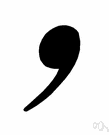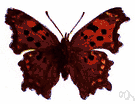comma
(redirected from COMMAS)Also found in: Thesaurus, Acronyms, Idioms, Encyclopedia.
comma
The comma ( , ) is one of the most commonly used punctuation marks in English. Commas are the same in appearance as apostrophes ( ’ ), but are placed on the bottom line of the text, in the same location as periods.
Generally speaking, commas are used to connect two or more elements in a sentence, but the way in which they do this varies widely, depending on what these elements are and how they are arranged in the sentence.
comma
punctuation mark (,) that indicates a pause in a sentence: A misplaced comma can convey a very different meaning.
Not to be confused with:
coma – deep prolonged unconsciousness
Abused, Confused, & Misused Words by Mary Embree Copyright © 2007, 2013 by Mary Embree
com·ma
(kŏm′ə)n.
1. Grammar A punctuation mark ( , ) used to indicate a separation of ideas or of elements within the structure of a sentence.
2. A pause or separation; a caesura.
3. Any of several nymphalid butterflies of the genus Polygonia having wings with irregularly notched edges and a small comma-shaped marking on the underside of the hind wing.
[Latin, from Greek komma, piece cut off, short clause, from koptein, to cut.]
American Heritage® Dictionary of the English Language, Fifth Edition. Copyright © 2016 by Houghton Mifflin Harcourt Publishing Company. Published by Houghton Mifflin Harcourt Publishing Company. All rights reserved.
comma
(ˈkɒmə)n
1. (Printing, Lithography & Bookbinding) the punctuation mark(,) indicating a slight pause in the spoken sentence and used where there is a listing of items or to separate a nonrestrictive clause or phrase from a main clause
2. (Music, other) music a minute interval
3. (Animals) short for comma butterfly
[C16: from Latin, from Greek komma clause, from koptein to cut]
Collins English Dictionary – Complete and Unabridged, 12th Edition 2014 © HarperCollins Publishers 1991, 1994, 1998, 2000, 2003, 2006, 2007, 2009, 2011, 2014
com•ma
(ˈkɒm ə)n., pl. -mas.
1. the sign (,), a mark of punctuation used to indicate a division in a sentence, as in setting off a word, phrase, or clause, to separate items in a list, to mark off thousands in numerals, to separate types or levels of information in bibliographic and other data, and, in Europe, as a decimal point.
2. a brown and black nymphalid butterfly, Polygonia comma, with a silver comma mark on the underwing.
[1520–30; < Late Latin: mark of punctuation, Latin: division of a phrase < Greek kómma piece cut off (referring to the phrase so marked) <kóptein to strike, chop]
Random House Kernerman Webster's College Dictionary, © 2010 K Dictionaries Ltd. Copyright 2005, 1997, 1991 by Random House, Inc. All rights reserved.
comma
A punctuation mark (,) used to separate items in a list or indicate a brief pause.
Dictionary of Unfamiliar Words by Diagram Group Copyright © 2008 by Diagram Visual Information Limited
ThesaurusAntonymsRelated WordsSynonymsLegend:
Switch to new thesaurus
| Noun | 1. |  comma - a punctuation mark (,) used to indicate the separation of elements within the grammatical structure of a sentence comma - a punctuation mark (,) used to indicate the separation of elements within the grammatical structure of a sentencepunctuation mark, punctuation - the marks used to clarify meaning by indicating separation of words into sentences and clauses and phrases |
| 2. |  comma - anglewing butterfly with a comma-shaped mark on the underside of each hind wing comma - anglewing butterfly with a comma-shaped mark on the underside of each hind wingbrush-footed butterfly, four-footed butterfly, nymphalid, nymphalid butterfly - medium to large butterflies found worldwide typically having brightly colored wings and much-reduced nonfunctional forelegs carried folded on the breast genus Polygonia, Polygonia - comma butterflies |
Based on WordNet 3.0, Farlex clipart collection. © 2003-2012 Princeton University, Farlex Inc.
Translations
فَاصِلَةفاصِلَه
čárka
komma
komo
pilkku
zarez
vesszõvessző
komma
コンマ
쉼표
kablelis
komats
virgulă
čiarka
vejica
komma
เครื่องหมายลูกน้ำ
dấu phẩy
Collins Spanish Dictionary - Complete and Unabridged 8th Edition 2005 © William Collins Sons & Co. Ltd. 1971, 1988 © HarperCollins Publishers 1992, 1993, 1996, 1997, 2000, 2003, 2005
Collins English/French Electronic Resource. © HarperCollins Publishers 2005
comma
n → Komma nt
Collins German Dictionary – Complete and Unabridged 7th Edition 2005. © William Collins Sons & Co. Ltd. 1980 © HarperCollins Publishers 1991, 1997, 1999, 2004, 2005, 2007
Collins Italian Dictionary 1st Edition © HarperCollins Publishers 1995
comma
(ˈkomə) noun the punctuation mark (,) used to show a slight pause etc.
Kernerman English Multilingual Dictionary © 2006-2013 K Dictionaries Ltd.
comma
→ فَاصِلَة čárka komma Komma κόμμα coma pilkku virgule zarez virgola コンマ 쉼표 komma komma przecinek vírgula запятая komma เครื่องหมายลูกน้ำ virgül dấu phẩy 逗号Multilingual Translator © HarperCollins Publishers 2009